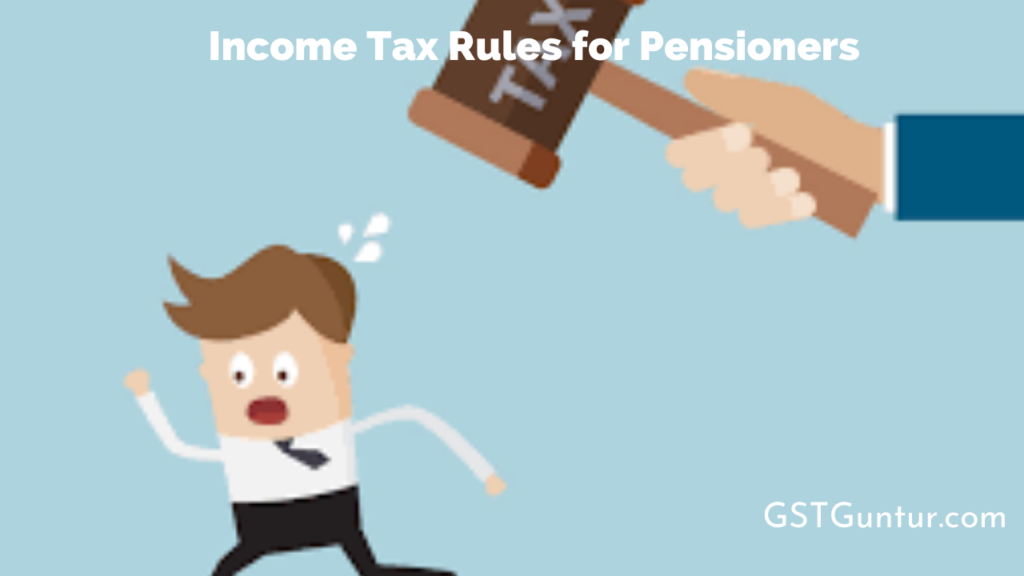Income Tax Rules for Pensioners: Pension is a non-fixed regular payment made by the government to the people who have retired officially from their respective jobs after completion of their service period.
The Pension is provided to the person only after his retirement or in case he was dismissed. This Pension amount is considered as a salary provided after the retirement of the employee. Hence, under the Income Tax Act 1961, Pension is taxable. The retired employee can opt to receive payment of his/her pension on a monthly basis (uncommuted pension) or a lump-sum amount (commuted pension).
Taxation Rules for Pension
The Income Tax Act, 1961 states that uncommuted pension is taxable as it is considered as a salary according to taxation laws. The pensioners who receive their pension through nationalized banks recorded deductions on salary under Section 89(1). Section 88 and 88B states that tax rebate adjustments are made by several banks when TDS is applied.
Tax Forms for Pensioners
There are four types of Income-tax forms introduced by the government for admissible purposes. Only Form ITR1 and ITR2 are applicable for pensioners out of the four forms.
ITR-1 Form or Sahaj
This form is also known as Sahaj. This form is only applicable for employees who earn a salary income of up to Rs.50 lakhs. They may earn this through the following modes;
- Salary income
- Pension income
- House property income
- Income from other sources
ITR-2 Form
This form applies to those employees who are not included and exempted from filing the taxes under Form ITR-1’s requirements. The employees may earn their income through the following modes;
- Salary income
- Pension income
- House property income
- Income from other sources
- Capital gains-income
- Foreign asset/income
- Income from agriculture (above Rs.5,000)
Tax Payment on Pension
Uncommuted pension is the pension provided to the retired employees who opted for pension receiving payment on a monthly basis. The Interim Budget 2019 stated that a complete tax rebate is granted to the taxpayers whose salary income is less than Rs.5 Lakhs. For the taxpayers who earned a salary above Rs.5 Lakhs, the income remained the same as it was in the previous year. In case of investment in Provident Funds and equities by a taxpayer, the taxpayer can claim tax deductions even when his/her salary is up to Rs.6 Lakhs. The salary deductions on salary and pension were increased to Rs.50,000 from Rs.40,000 which was the previous value.
The tax is paid for the pension recognized as a salary income received by the pensioner. The interest amount is taxed as income from other sources when the interest earned on the investment is made. Public Provident Fund is the only investment instrument that is fully exempted from tax payment.
TDS on Pension
A percentage of the income of an individual is deducted as TDS who receive their salary through Nationalised Banks. TDS exemption on salary and pension may increase to Rs.40,000 from the prevailing amount which is Rs.10,000 which the Finance Minister announced. Hence, the taxpayers whose salary is less than or up to Rs.40,000 are exempted from paying TDS.
Pradhan Mantri Shram Yogi Mandhan
It was announced by the Finance Minister that the government will introduce a new scheme named Pradhan Mantri Shram Yogi Mandhan. This introduction of a new scheme in the Union Budget stated that a minimum pension of Rs.3,000 will be provided to workers from the unorganized sector. This scheme was only applicable for workers who reached the retirement age of 60 years.
There was one more major announcement made for a new addition and rectification made in the budget. It stated that there was a change in tax administration that facilitated the processing of all tax returns and this was done within 24 hours. The refund is simultaneously processed along with this procedure. The Interim Budget 2019 was a huge benefit for the pensioners which showed the changes in tax slabs and helped them to increase their savings.
FAQ’s on Income Tax Rules for Pensioners
Question 1.
Is the date of voluntary retirement treated as duty?
Answer:
According to Rule 5, the date of voluntary retirement is treated as a duty.
Question 2.
Which employee is eligible for Pension?
Answer:
Under Rule 2 and 49, a government employee appointed before 31st March 2003 is provided with a pension after his retirement with a qualifying service of 10 years or more.
Question 3.
Which rule governs pension to employees after they retire from the Government department?
Answer:
Central Civil Services (Pension) Rules, 1972, is the governing body for pension to employees after they retire from the Government department.
Question 4.
Is Pension income taxed as salary income?
Answer:
Yes, Pension income is taxed as salary income but pension received from the United Nations Organisation is exempted.
Question 5.
Is family income taxed as salary income?
Answer:
No, family income is taxed as income from other sources.
Question 6.
What is the Tax-free allowance of pensioners?
Answer:
The tax-free allowance of pensioners is below or up to Rs.40,000 salary income.
Question 7.
Is TDS deducted on monthly pension?
Answer:
TDS is deducted from the pension on a monthly pro-rata basis. When the estimated total annual pension crosses the amount limit of Tax, it is taken into consideration under the account proof of investments.
Question 8.
What is the rebate available under the Income Tax Act?
Answer:
As per the amendments made in Section 87A of the Income Tax Act, a tax rebate of Rs.12,500 is allowed if the total income is below or up to Rs.5 Lakhs.
Question 9.
Is submission of investment declaration necessary in the tax calculation period?
Answer:
Yes, the submission of an investment declaration is necessary for claiming a rebate in the tax calculation period.
Question 10.
Can a pensioner questions a deduction of additional tax?
Answer:
No, there is no provision for deduction of additional tax.
